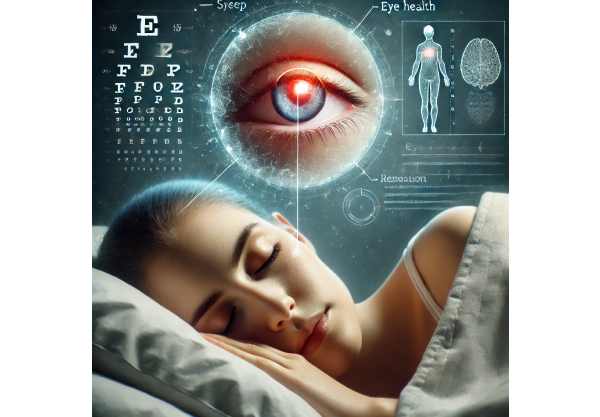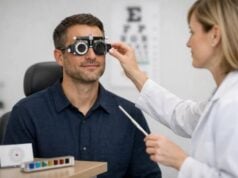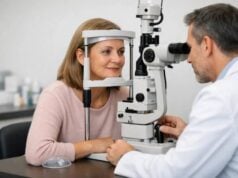
Sleep is not just downtime for your brain—it is maintenance time for your eyes. During a full night of rest, your tear film stabilizes, the surface of your cornea recovers from wind, screens, and blinking strain, and subtle inflammation has a chance to calm. When sleep is short or fragmented, many people notice the change first in their eyes: dryness, burning, gritty discomfort, light sensitivity, twitching, and slower focusing. Over time, poor sleep can also intersect with bigger eye-health issues, including fluctuating eye pressure and higher risk patterns seen in people with sleep disorders. The good news is that the eye-sleep connection is practical: small changes in timing, bedroom conditions, and screen habits often translate into clearer, more comfortable vision—sometimes within days, not months.
Essential Insights
- Consistent sleep supports a healthier tear film and can reduce daily dry-eye symptoms.
- Short or poor-quality sleep often worsens redness, irritation, and light sensitivity the next day.
- Sleep disorders such as sleep apnea may raise risk for certain eye problems and deserve medical evaluation.
- Aim for a stable sleep schedule and a screen cutoff of 60–90 minutes before bed to reduce eye strain.
Table of Contents
- How sleep keeps your eyes comfortable
- Can poor sleep worsen dry eye symptoms
- Does sleep affect eye pressure and glaucoma risk
- Why screens and late nights strain vision
- Sleep disorders that can harm your eyes
- A practical sleep plan for healthier eyes
How sleep keeps your eyes comfortable
If you want to understand why sleep matters for eye health, think in layers. Your eyes do not just “look”—they maintain a delicate surface ecosystem made of the cornea, conjunctiva, eyelids, and a thin tear film that must stay smooth for clear vision. Sleep supports that ecosystem in three quiet but important ways.
First, sleep is recovery time for the ocular surface. All day, your eyes face airflow, heating or air conditioning, allergens, contact lens friction, and prolonged staring. These exposures increase tear evaporation and can create tiny areas of surface stress. Overnight, with eyes closed, evaporation drops. The tear film can redistribute, and the surface gets a break from constant environmental attack. Many people notice this as less burning and less “sand-in-the-eye” feeling after a solid night.
Second, sleep supports tear balance and blinking mechanics. While you are awake, blinking spreads the tear film like a windshield wiper. When you are tired, blink patterns often change: blinks can become incomplete, slower, or less frequent—especially during screen use. That leaves dry patches that blur vision and trigger reflex tearing (watery eyes that paradoxically happen with dryness). Adequate sleep helps restore more normal blink timing and steadier focusing.
Third, sleep is linked to inflammation control. Eye discomfort is not only about “not enough tears.” In many people, irritation reflects surface inflammation and meibomian gland dysfunction (oil-gland problems in the eyelids). Sleep loss can nudge the body toward higher inflammatory signaling, and your eyes—exposed tissue with a busy immune interface—feel it quickly.
A helpful way to monitor your own eye-sleep connection is to track two signals for a week: morning comfort (0–10) and afternoon screen tolerance (how long until discomfort starts). If both improve when you sleep longer or more consistently, that pattern is meaningful, even without any new drops or devices.
Can poor sleep worsen dry eye symptoms
Yes—poor sleep commonly worsens dry eye symptoms, and it can do so fast. Many people wake after a short night with scratchiness, blurred vision that clears after blinking, or a heavy-lid feeling that makes the eyes feel “strained” before the day even begins. This is not imagination; it is a predictable result of how the tear film behaves under stress.
What changes after a bad night
A short or fragmented night often leads to:
- More tear evaporation: Tired people frequently blink less and have more incomplete blinks, which leaves the tear film uneven.
- Higher sensitivity: The nerves on the corneal surface can become more reactive when the surface is stressed, making light and wind feel harsher.
- More redness: Poor sleep can increase visible vessel dilation and irritation, especially if combined with alcohol, dehydration, or late-night screen use.
Dry eye and “watery eyes” can coexist
A common confusion is tearing. People assume watery eyes mean they have “too many tears,” but watery eyes can be a sign of poor tear quality. When the tear film breaks up quickly, the eye may respond with emergency watery tearing that does not contain the right oil and mucin balance to stay stable. Poor sleep can amplify that instability.
Who tends to notice the biggest effect
Sleep-related dry eye flares are especially common in:
- Contact lens wearers (surface friction adds to the load).
- Heavy screen users (blink disruption).
- People with allergies or eyelid inflammation (already sensitized surfaces).
- Anyone with a bedroom environment that dries the air (heated rooms, fans, or vents blowing toward the face).
If you suspect sleep is a trigger, test a simple experiment: for 7 nights, keep wake time the same, move bedtime earlier by 30–60 minutes, and stop screens 60 minutes before lights out. If your symptoms improve meaningfully, sleep is likely part of your dry eye management—not an optional add-on.
Does sleep affect eye pressure and glaucoma risk
Eye pressure, formally called intraocular pressure (IOP), is not a fixed number. It changes throughout the day and night, influenced by body position, fluid balance, and normal circadian rhythms. Because glaucoma risk is strongly tied to how the optic nerve tolerates pressure and blood flow, sleep becomes relevant in two ways: nightly pressure patterns and sleep disorders that disrupt oxygen and circulation.
Nighttime pressure patterns matter
Many people have higher IOP at night, especially when lying flat. For most, this is not a problem. But in people with glaucoma—or those at high risk—those nighttime peaks can matter because optic nerve damage is related to repeated stress over time. Sleep itself is not “bad”; the concern is whether your sleep habits and sleep-related conditions are pushing IOP patterns into a riskier range.
Sleep apnea is a key intersection
Obstructive sleep apnea (OSA) is marked by repeated breathing pauses during sleep, which can reduce oxygen and cause surges in blood pressure and stress hormones. In eye care, OSA is often discussed alongside glaucoma because both involve optic nerve vulnerability and circulation. The relationship is complex: not everyone with OSA gets glaucoma, and not everyone with glaucoma has OSA. Still, if someone has glaucoma progression that does not match their daytime office IOP readings, clinicians often consider sleep history as part of the full picture.
Practical takeaways if you have glaucoma concerns
If you have glaucoma, ocular hypertension, or a strong family history, consider these steps:
- Tell your eye clinician about sleep quality (snoring, choking awakenings, insomnia, unusually heavy daytime sleepiness).
- Ask whether nighttime IOP patterns are relevant for your case (some people benefit from treatment timing adjustments).
- Avoid extreme sleep positions if advised—some individuals are counseled to avoid pressing the eye into a pillow or sleeping face-down.
- Treat sleep disorders seriously because better breathing and more stable sleep can support overall vascular and nerve health.
Sleep is not a substitute for glaucoma care, but it can be a meaningful factor in the overall risk landscape—especially when sleep apnea or severe insomnia is present.
Why screens and late nights strain vision
Late nights often come with screens, bright light, and mental stimulation—exactly the combination that makes eyes feel worse the next day. The result is frequently labeled “eye strain,” but the real picture is usually a mix of focusing fatigue, dry eye flare, and sleep-driven sensitivity.
The focusing system gets overworked
When you read or scroll, your eyes maintain near focus using small muscles that adjust the lens inside the eye. After hours of near work—especially in low lighting—you can end up with temporary blur at distance, headaches around the eyes, or a feeling that focusing is “sticky.” Poor sleep makes this worse because your tolerance for sustained near work decreases when you are tired, and your brain’s visual processing speed slows.
Blue light is not the whole story
People often focus on blue light, but behavior matters at least as much as wavelength. Screen time tends to:
- Reduce blink rate and increase incomplete blinks.
- Keep the eyes open wider (more evaporation).
- Encourage poor posture (more neck strain and headache overlap).
- Extend the day late into the night (less total sleep time).
A realistic evening routine that helps eyes
You do not need a perfect “digital detox” to get benefits. Try these changes:
- Set a screen cutoff: 60–90 minutes before bedtime, switch to non-screen wind-down when possible.
- Dim and warm your environment: lower brightness, reduce harsh overhead light, and avoid staring at a bright phone in a dark room.
- Use the 20-20-20 reset during evening work: every 20 minutes, look at something 20 feet away for 20 seconds.
- Add blink cues: every time you hit “send” or finish a paragraph, do 5 slow, complete blinks.
These steps reduce tear evaporation and focusing fatigue while also making sleep onset easier. Better sleep then compounds the benefit the next day, creating a positive loop: less irritation → more comfortable screen use → earlier shutdown → better sleep.
Sleep disorders that can harm your eyes
Not all sleep problems are the same. Occasional late nights are common, but persistent symptoms can point to sleep disorders that deserve medical attention—both for general health and for eye health.
Obstructive sleep apnea
OSA is one of the most eye-relevant sleep disorders. Beyond glaucoma discussions, OSA is also linked with issues such as eyelid laxity, recurrent irritation, and sometimes worsening dry eye symptoms. The mechanism is often indirect: poor oxygen stability, increased inflammation, and fragmented sleep that disrupts normal repair. Classic signs include loud snoring, witnessed breathing pauses, morning headaches, and daytime sleepiness. If these are present, a sleep evaluation can be life-changing.
Insomnia and chronic short sleep
Insomnia is more than “trouble sleeping once in a while.” When it becomes chronic, you spend more time awake with eyes open, often under artificial light, and commonly with more screen exposure. This combination increases dryness and sensitivity, and many people develop a cycle: discomfort makes it harder to sleep, and poor sleep makes discomfort worse. Breaking the cycle often requires addressing both sleep behavior and eye comfort.
Night shift and circadian disruption
Shift work can disrupt circadian rhythms, leading to irregular sleep timing and shorter sleep windows. For eyes, that often means more fatigue, reduced tear stability, and more frequent reliance on caffeine and screens—factors that can amplify symptoms. If you work nights, the goal becomes consistency (even if the schedule is unusual), strategic light exposure, and intentional recovery sleep.
When to seek care promptly
Seek professional help if you have:
- Snoring plus choking awakenings or severe daytime sleepiness.
- Dry eye symptoms that are persistent, painful, or worsening.
- New flashes, floaters, sudden blur, or eye pain (these are not “sleep issues” and need urgent eye evaluation).
- Glaucoma risk factors plus poor sleep symptoms.
A key point: sleep disorders are treatable. Addressing them can improve energy, cardiovascular health, mood, and often the day-to-day comfort of your eyes as well.
A practical sleep plan for healthier eyes
If you want a plan that supports eye health, focus on what you can control: timing, environment, and the behaviors that quietly sabotage both sleep and tear stability.
Step 1: Stabilize timing first
For most adults, the highest-leverage move is a consistent wake time, even on weekends. Once wake time is stable, aim for a bedtime that reliably gives you enough time in bed. Many people find that 7–9 hours is the range where eye comfort, mood, and focus all improve.
Step 2: Make the bedroom “eye friendly”
Dry air is a common hidden trigger. Consider:
- Keeping the room comfortably cool rather than overly heated.
- Avoiding fans blowing directly at your face.
- Using a humidifier if indoor air is very dry.
If you wake with gritty eyes, check for subtle eyelid opening during sleep; some people sleep with lids slightly parted. An eye professional can help if this is suspected.
Step 3: Reduce late-night tear evaporation
Evening habits can prime dryness for the next day:
- Stop contact lens wear earlier in the evening if you are prone to dryness.
- Reduce alcohol close to bedtime (it can worsen sleep quality and dehydration).
- Add a short “blink and distance” break during late work sessions.
Step 4: Build a 10-minute wind-down
A short routine beats a perfect one. Choose two:
- A warm shower or warm compress to relax eyelids.
- A paper book or audio content instead of scrolling.
- Gentle stretching to reduce tension headaches that mimic eye strain.
- A simple to-do list for tomorrow to reduce bedtime rumination.
Step 5: Track what changes
For two weeks, note bedtime, wake time, and a 0–10 eye comfort score at midday. This helps you see patterns and prevents “guessing” what works. If symptoms remain significant, treat sleep as one pillar—alongside eye exam, eyelid care, and dry eye treatment when appropriate.
References
- The Association Between Sleep Disorders and Incidence of Dry Eye Disease in Ningbo: Data From an Integrated Health Care Network 2022
- Association between sleep quality and dry eye disease: a systematic review and meta-analysis 2024 (Systematic Review)
- Primary open angle glaucoma and sleep apnea syndrome 2024 (Review)
Disclaimer
This article is for educational purposes only and does not replace personalized medical advice, diagnosis, or treatment. Eye symptoms can overlap across many conditions, and some problems—such as sudden vision loss, flashes, new floaters, significant eye pain, or rapidly worsening redness—require urgent evaluation. If you have dry eye disease, glaucoma, suspected sleep apnea, or another medical condition, discuss your symptoms and sleep patterns with an eye care professional and your primary care clinician to determine the safest, most appropriate plan for you.
If you found this helpful, please consider sharing it on Facebook, X (formerly Twitter), or any platform you prefer, and follow us on social media. Your support through sharing helps our team continue producing high-quality, evidence-informed health content.






